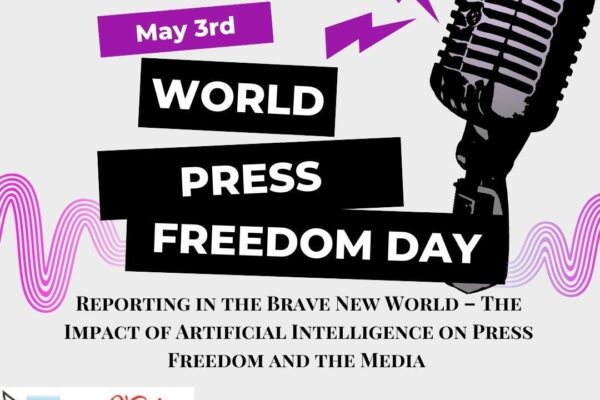
MRA Launches Visual Brief to Commemorate 2025 World Press Freedom Day
Ahead of this year’s World Press Freedom Day on May 3, Media Rights Agenda (MRA) has launched an informative visual brief to highlight the urgent need for responsible and ethical deployment of Artificial Intelligence (AI) in journalism, especially within Nigeria’s media landscape. The visual brief, developed under this year’s global theme, “Reporting in the Brave New World – The Impact of Artificial Intelligence on Press Freedom and the Media,” explores the opportunities and dangers AI poses to media freedom in Nigeria and across the world. In a statement released in Lagos by its Programme Officer, Mr. John Gbadamosi, MRA noted that AI is quickly changing the way news is produced and consumed, adding that it offers powerful tools that can assist journalists in analysing data, translating stories into local languages, and extend the reach of vital information, especially to underserved areas with limited media infrastructure as AI can help to ensure that essential news and information are also disseminated to such communities. However, Mr. Gbadamosi warned that the same technology is being weaponised to undermine truth and press freedom, saying: “While AI can be used to advance journalism, it can just as easily be exploited to spread disinformation, create deepfakes, and drown out independent voices with algorithmically generated propaganda.” According to him, “In Nigeria, journalists face threats that go beyond just physical dangers; such threats now also encompass digital, algorithmic, and systemic harms and challenges, which requires media professionals to ensure that AI enhances, rather than undermines, media freedom and that technology is used to promote the truth, not distort it.” The visual brief breaks down key concepts like misinformation, disinformation, mal-information, and information overload, which are increasingly shaping Nigeria’s digital media ecosystem. It also raises concerns about AI-enabled surveillance, political manipulation, and the marginalisation of community-based journalists. Mr. Gbadamosi explained that through the visual brief, MRA is also canvassing support for independent media outlets, transparent AI regulation that reflects Nigeria’s socio-political realities, widespread digital literacy to empower citizens to navigate the information space and greater accountability from technology companies for the content and influence of their platforms. He therefore urged all stakeholders to advocate for responsible AI usage and a free, independent, professional and vibrant media environment in Nigeria, stressing that “when media freedom thrives, democracy lives.” The visual brief is available at https://bit.ly/4cXfVt7.


